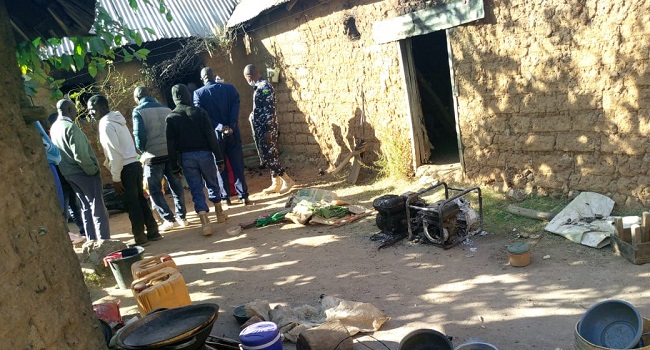
German police on Friday found an “explosive” containing nails close to a Christmas market in Potsdam, reviving fears of a repeat of last year’s terror attack that struck at the height of the festive season.
The device was uncovered in a package found at a pharmacy just off the Christmas market in central Potsdam, a picturesque city near Berlin that was once a residence for the kings of Prussia.
Police said a pharmacist had sounded the alert after finding a canister with wires inside the package.
“Suspicions of an unconventional explosive device have been confirmed,” police in Brandenburg state said on Twitter.
“There were apparently not only nails but also powder in the canister, and that must be investigated, could it be plaster, or something that doesn’t explode or is it something explosive,” said Brandenburg interior minister Karl-Heinz Schroeter.
He added that investigators were unlikely to be able to give “binding results” on the device today.
After clearing parts of the city centre and Christmas market, bomb disposal units defused the device shortly before 6pm.
“It’s not easy when you’re on the scene, we’re shocked,” Christmas market organiser Peter Klemm told broadcaster NTV.
“But the people here understand what’s going on and take the measures very seriously.”
– High alert-
Germany has been on high alert for possible jihadist attacks after last December’s deadly assault at a Christmas market in central Berlin.
The attacker, Tunisian asylum seeker Anis Amri, hijacked a truck and murdered its Polish driver before killing another 11 people and wounding dozens more by ploughing the heavy vehicle through the festive market in the centre of the city.
He was shot dead by Italian police in Milan four days later while on the run.
Germany has since been targeted again in attacks with radical Islamist motives.
In July 2017, a 26-year-old Palestinian asylum seeker wielding a knife stormed into a supermarket in the northern port city of Hamburg, killing one person and wounding six others before being detained by passers-by.
German prosecutors said the man likely had a “radical Islamist” motive.
And at the end of October, German police arrested a 19-year-old Syrian identified only as Yamen A. suspected of planning a “serious bomb attack” using powerful explosives.
The IS also claimed responsibility for a number of attacks in 2016, including the murder of a teenager in Hamburg, a suicide bombing in the southern city of Ansbach that wounded 15, and an axe attack on a train in Bavaria that left five injured.
Germany remains a target for jihadist groups, in particular because of its involvement in the coalition fighting IS in Iraq and Syria, and its deployment in Afghanistan since 2001.
German troops in the anti-IS coalition do not participate in combat operations but support it through reconnaissance, refuelling and training.
Germany’s security services estimate there are around 10,000 Islamic radicals in Germany, some 1,600 of whom are suspected of being capable of using violence.
Chancellor Angela Merkel has also come under fire for allowing in more than one million asylum seekers in the past two years, with the decision fueling the rise of the far-right Alternative for Germany (AfD) party, which claims the influx spells a heightened security risk.



